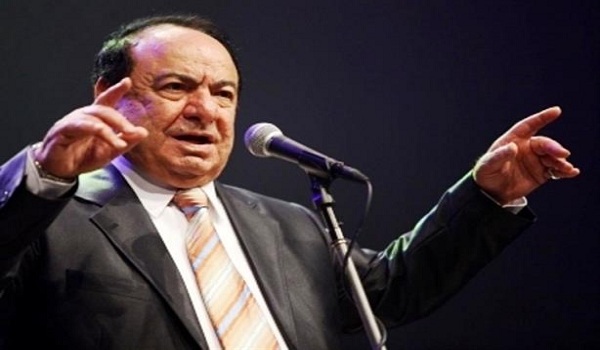“Oh beloved, if you go away, world will be a gloomy place”, with those melodic words broadcasted on radio, I initiated my day, the second of October. They are a very famous refrain of a song of the legendary Syrian singer Sabah Fakhri. Then, the trembling voice of the Syrian prestigious singer Mayada Alhanawi cut the beautiful melodies announcing the death of this great Syrian singer. She was crying in a phone call with a Syrian radio station, “Oh, my beloved friend, I cannot believe you passed away.”
Yes, it is the legendary Syrian singer Sabah Fakhri, known across the Arab world, who has entertained generations with traditional songs and preserved nearly extinct forms of Arabic music, died of natural causes on Tuesday at the age of 88.The Damascus branch of the Syndicate of Artist said it would later announce details about the singer’s burial and funeral.
With over 50 years of fame and popularity as a singer, Sabah Fakhri modified and popularized the then-fading forms of traditional Arabic music Muwashahat and Quddud Halabiya. He was well known for his strong vocals, execution of Maqamat and harmony, as well as his charismatic performances.
 Born Sabah Abu Qaws in the Syrian city of Aleppo in 1933, Fakhri got his stage name as an adolescent when he started performing. He soon rose to fame to become one of the Arab world’s legendary tenors and one of its exceptionally charismatic entertainers.
Born Sabah Abu Qaws in the Syrian city of Aleppo in 1933, Fakhri got his stage name as an adolescent when he started performing. He soon rose to fame to become one of the Arab world’s legendary tenors and one of its exceptionally charismatic entertainers.
He was given the stage name “Fakhri” by his mentor, Syrian nationalist leader Fakhri al-Barudi, who encouraged him as a young boy to stay in Syria and not travel to Italy. One of Fakhri’s earliest performances was in 1948 at the Presidential Palace in Damascus, before President Shukri al-Quwatli and Prime Minister Jamil Mardam Bey.
Unlike many Arab artists, he never studied or worked in Cairo, insisting that his fame is linked to the artistic heritage of his homeland, Syria. Sabah Fakhri is one of the very few singers from Arabic-speaking countries to have reached widespread popularity by singing in the Arabic language (including Europe, Asia, the Americas, and Australia).
Fakhri was a world class Tarab singer, an Arabic form of music associated with emotional evocation that can last for hours. Well-known for performing concerts that could go on for hours, he once performed for 10 hours straight in 1968, at a concert in Caracas, Venezuela, without a single break, earning an entry in the Guinness World Records.
A symbol of the golden age of Arabic song, Fakhri was able to keep his audience in suspense for hours by tirelessly repeating the verses of classical or contemporary Arabic poems. On stage, Fakhri would engage the audience and sway to the music almost in a trance, turning the lyrics of his songs, often in classical Arabic, into refrains they can easily sing back with him.
When he performed, Fakhri insisted on interacting with his audience. Before singing, he insisted on having a good atmosphere by having good musicians and an appropriate sound system. While performing he asked for the lights to remain on, to interact with the audience. He said that the audience played a key role in bringing out the performer’s creativity. The audience should be aware of the music and poetry, so they would value the music given to them.
Born in the northern province of Aleppo and hailed as one of Syria’s greats, Fakhri was known for his masterful delivery of traditional Syrian songs that combined Arabic poetry with music. Throughout his career, Fakhri preserved and popularized traditional forms of Arab singing and music, including Quddud Halabiya, native to his hometown Aleppo. The short stout man modified and popularized the Quddud Halabiya — a traditional form of Aleppine music that combines lyrics based on the poetry of Al-Andalus with old religious melodies collected mostly by musicians from the northern Syrian city. Fakhri sang many traditional songs from Aleppo, based on the poems of Abu Firas al-Hamdani, Al-Mutanabbi and other poets. He also worked with contemporary composers. Some of his most popular songs are: YāHādī al-‘Ess / Mālek YāḤelwa(t) Mālek, Khamratel-Ḥobb, YāṬīra(t) Ṭīrī, Fōgel-Nakhal (Iraqi song), ’Adduka al-Mayāss, YāMālel-Shām, MuwashshaḥImlīlī / YāShādīel-Alḥān, Eba‘atlīJawwāb, Ah Yā Ḥelō.
 Fakhri’s voice was so powerful and distinct, he once told his interviewers that his family recognized it when he was a baby.“I started singing when I was born,” he once told an interviewer for Egyptian TV CBC. A family member used to pinch him to hear him cry because “he liked the sound of my crying.”
Fakhri’s voice was so powerful and distinct, he once told his interviewers that his family recognized it when he was a baby.“I started singing when I was born,” he once told an interviewer for Egyptian TV CBC. A family member used to pinch him to hear him cry because “he liked the sound of my crying.”
He memorized the Quran when young and began reciting in mosques — a common path for a number of musicians and singers in the Arab world. Because of his powerful voice, Fakhri briefly worked as a muezzin — the person who calls for prayers — at a mosque in Aleppo.“Quran is the great school for performance and good and clear pronunciation,” he said in an interview, aired in 2014.Fakhri studied music and singing in Aleppo and Damascus, the Syrian capital.
He earned various honours in the Arab world and was head of the Syrian Artists Syndicate. Fakhri was also awarded the Syrian Order of Merit of Excellent Degree by the Syrian president Bashar al-Assad in recognition of his achievements in serving and his role in reviving the artistic heritage of Syria.
Fakhri is survived by four sons, including Anas, a singer.
Report: Lama Alhassanieh

